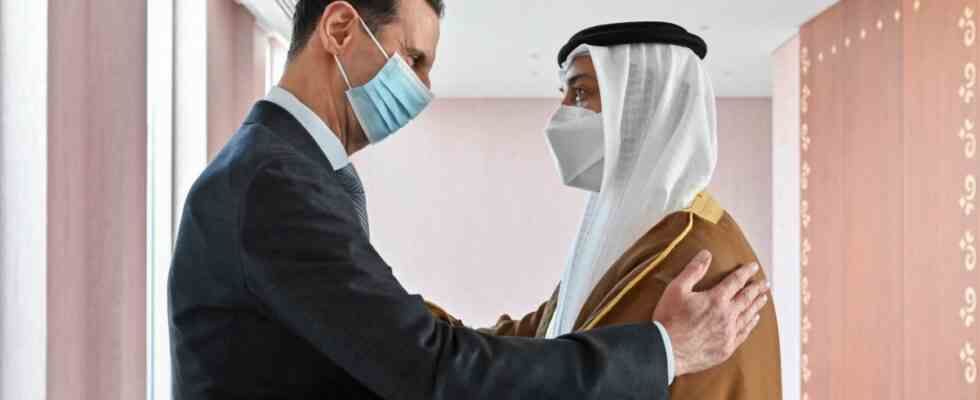It is the clearest sign of rapprochement since the outbreak of the Syrian war in 2011: Last Friday, ruler Bashar al-Assad traveled to an Arab country, the United Arab Emirates, for the first time. There he met the Crown Prince of Abu Dhabi and de facto ruler of the Emirates, Sheikh Mohammed bin Zayed, and the Emir of Dubai, Sheikh Mohammed Rashid bin Maktoum.
The Syrian news agency Sana published photos of the scene, in which both heads of government were sitting across from each other, smiling. The rapprochement with its wealthy Gulf neighbors is just what the Assad regime needs: Moscow is Damascus’ closest partner, and Western sanctions against Russia because of the invasion of Ukraine are having a direct impact on Syria’s desolate economy. According to observers, the leaders discussed how Abu Dhabi could provide political and humanitarian support in Syria and boost trade between the nations.
It was not until mid-March that supporters of the Syrian democracy movement recalled the beginning of the peaceful protests during the so-called Arab Spring, which was celebrating its eleventh anniversary. The brutal actions of the Assad regime are said to have cost the lives of 350,000 to 500,000 Syrians and forced 13 million people to flee, six million of them within the embattled country.
US is ‘deeply disappointed and concerned’
The Arab neighbors responded at the time by expelling Syria from the Arab League, shutting down trade and freezing government accounts in Damascus. But in recent years, Abu Dhabi, among others, has decided to break Syria’s isolation: the Gulf state reopened its embassy there in 2018, and in November last year the UAE’s Foreign Minister Sheikh Abdullah bin Zayed traveled to Damascus to meet Assad.
The US said it was “deeply disappointed and concerned” by the Emirates’ decision to welcome Assad. Until then, Assad had only visited Russia and Iran, important allies of his regime. Relations between the US and the United Arab Emirates have cooled significantly under the leadership of new US President Joe Biden. American efforts to reinstate the Iran nuclear deal continue to anger Gulf rulers. Through the contact with Damascus, Abu Dhabi also hopes to curb Iranian influence in Syria.
The Germans are also courting Abu Dhabi
Washington is just as critical of Abu Dhabi’s increasing security cooperation with China, for example in the area of cyber and information warfare. In December, therefore, a 23-billion-dollar deal for the supply of American F-35fighter jets agreed upon in the final days of the previous Trump administration. The Emirates cited the “overexpensive security requirements” set by Washington as the cause.
Abu Dhabi is also self-confident because the West urgently needs more energy suppliers after the Russian invasion of Ukraine. The Emirates offer ideal conditions for the production of green hydrogen. Federal Economics Minister Robert Habeck (Greens) is expected to hold talks in the Emirates this Sunday evening.

